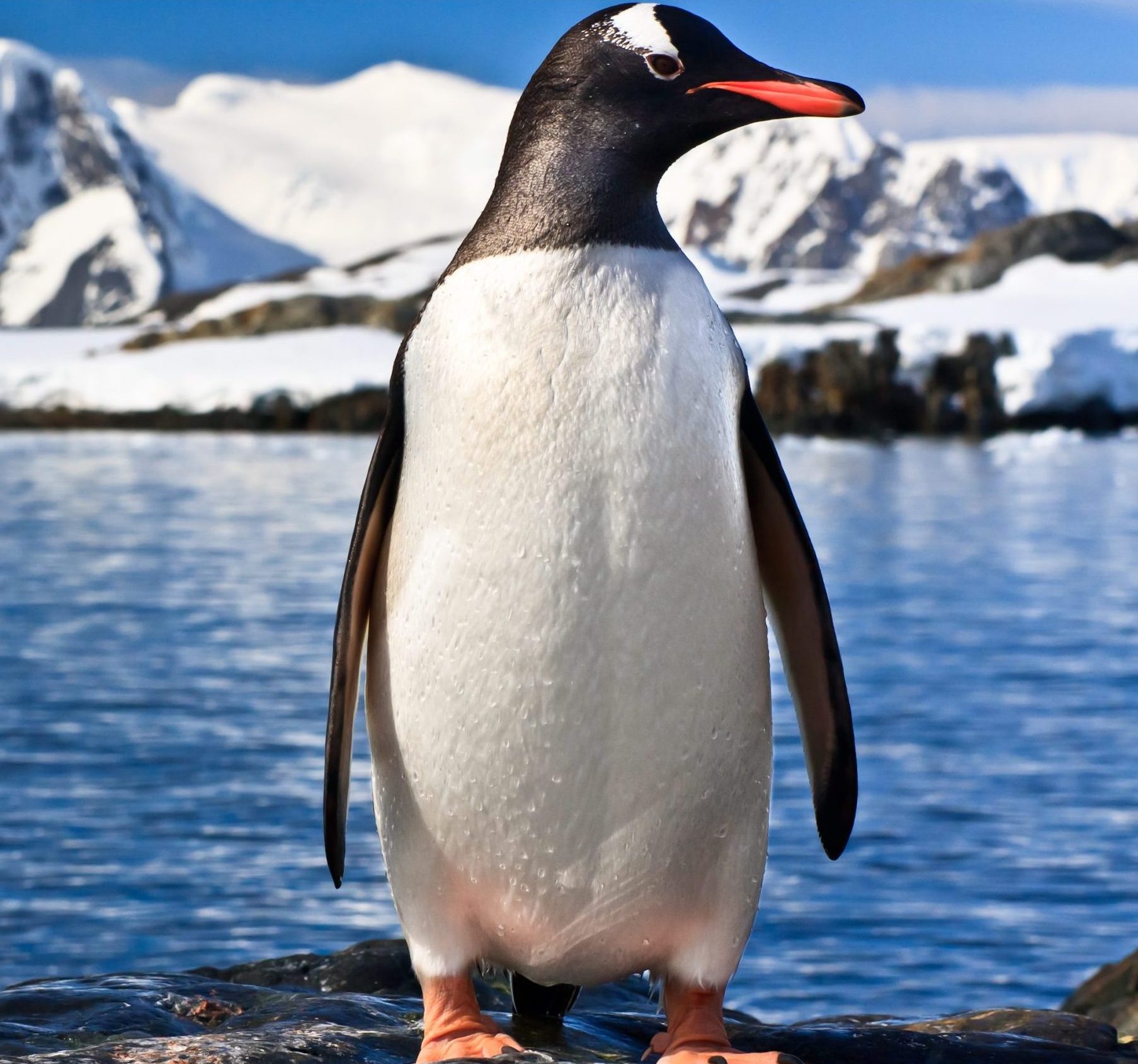How Antarctica Can Become An Example for Responsible Ocean Tourism
Antarctica has become a symbol for climate change—so how does a sustainable travel company balance operating trips in this fragile ecosystem with meeting its environmental and social responsibilities?
This was the question Intrepid Travel asked—and that we continue to be asked by both internal and external stakeholders—since we announced our expansion into Antarctica in 2019. For Intrepid, setting up operations in Antarctica was a considered choice. But that didn’t make it an easy decision.
Intrepid made the decision to operate in Antarctica as we believed it would offer an incredible experience and create value for our customers, partners and shareholders. We also knew that operating our own product would provide us with greater control of all aspects, including environmental considerations. Like all Intrepid trips, Antarctica voyages are 100 percent carbon-neutral and we continue to work to decarbonise our whole business, in line with our seven-point Climate Action Plan [1]. That being said, we recognise that offsets are not enough to address the climate crisis, which is why we have committed to science-based targets to decarbonise our business at the pace and scale that science tells us is necessary to limit global warming to 1.5C. We were also confident in the governance framework of Antarctica and believed that could help inform the evolution of ocean tourism in other parts of the world, too.
As the world’s largest travel B Corporation, Intrepid considers a triple bottom line of people, planet and profit, and Antarctica is no different. We thought deeply about the positive—and negative—impacts our trips would have and tried to adopt a model that balanced both.
Intrepid has been carbon-neutral for 12 years, and we’re the only tour operator in the world with verified science-based climate targets with the Science Based Targets initiative, which drives ambitious private-sector climate action. As a new Antarctica operator, Intrepid was confident we would not only learn from other leading operators in Antarctica but also that in time we could share our experience and help further improve sustainability criteria in polar travel.
Cross-industry collaboration is a powerful vehicle for change, one that I believe drives innovation. I also co-chair the World Travel and Tourism Council, whose members are global private-sector tourism businesses, and last year I attended COP26 on Intrepid’s behalf to lead discussions that culminated in the signing of the Glasgow Declaration on Climate Action in Tourism. That signalled the first time the global travel industry came together on a shared vision for addressing carbon emissions through agreed targets.
Intrepid is a relatively new player in Antarctica, but the continent has long been supported by strong governance—unlike many of the other destinations in which we operate. Much of the approach to tourism in Antarctica can provide a baseline for a more responsible cruise industry worldwide. As part of a responsible future for Antarctica tourism, we can draw on lessons that help inform the entire cruise industry. Three come to mind:
- Model governance framework
One of the greatest challenges for responsible ocean tourism is governance. The term international waters has become a crutch justifying an inability to enforce things like illegal waste dumping, rising carbon emissions from shipping, overfishing and even severe human rights violations. The Antarctic Treaty System creates a framework for governance at a continental level. This treaty was drafted in 1959 as a collective agreement to ensure Antarctica would always exist in the pursuit of peace and for science. It notably is not governed in the pursuit of wealth and prosperity, or resource extraction. Tourism operators can only get licenses to operate from a government body that is part of the treaty, which helps limit operations.
Restrictions around capacity management are noteworthy. Only 72 ships are licensed for tourism in Antarctica. These collectively carry an average of 75,000 travellers to Antarctica each year. Ships are further broken down into categories based on capacity. Category 1 is less than 200 travellers, Category 2 is 200–500 travellers and Category 3 is more than 500 travellers. Ships in this last category cannot land on the Antarctica Peninsula. Each excursion to land is governed by a strict set of specific guidelines designed to limit the impact on the environment. Furthermore, specific requirements on using marine gas oil apply to all ships.
However, a clear gap exists in the collective response to climate change by Antarctica’s regulating industry body, the International Association of Antarctica Travel Operators (IAATO). IAATO has the opportunity to lead with agreed targets and we look forward to being part of that industry-wide response.
Building on this Antarctic Treaty System framework has helped us understand the path to more responsible ocean tourism, but we have a long way to go. For Intrepid, decarbonising operations in line with our science-based carbon emissions targets is a key factor. However, we aren’t kidding ourselves that this will be easy to achieve. The key step will be investing in a new energy-efficient ship as part of our commitment to net-zero emissions by 2035.
- Tourism and the pursuit of peace and science
The Antarctic Treaty governs all activity on the continent, which means travel operations tend to be developed both directly and indirectly in the pursuit of peace and science. This makes holidaying in Antarctica truly different from a cruise anywhere else.
We also know that travel brings people together and provides a glimpse into fragile environments, extraordinary wildlife and the threats facing these places. This shared understanding and deeper respect for other people and places plays a crucial role in protecting our planet for the future.
Antarctica tourism goes even further by working closely with the scientific community. Much of global ocean tourism is extractive in the sense it does little to mitigate travellers’ impact, let alone understand it. But the idea that tourism can support science and research is a shared-value model worth exploring.
Intrepid has looked to incorporate citizen science into our polar voyages, most notably in our partnership with the World Wildlife Fund on WWF Giants of Antarctica sailings[2]. This allows travellers to work alongside WWF-Australia’s scientists to further their research into whales. Data collected on these trips, including by travellers, contribute directly to understanding of whale populations. Although critics may say tourist participation can be a form of performative impact, it is more about providing travellers with an opportunity to understand the environmental implications of a place they are visiting. Plus, the science being conducted is real and leads to real results, as we’ve seen time and time again.
Citizen science also deepens a traveller’s sense of purpose in a destination—it goes beyond the idea that simply visiting Antarctica will make a traveller a steward of the destination. It actually brings together leisure and science, people and planet and has exciting potential for tourism more broadly, on both water and land.
- Economic paradigm shift: Value over volume
Antarctica is the antithesis of mass tourism compared to the wider global cruise industry. In 2019, 74,401 people travelled to Antarctica—a fraction of the 32 million people who cruised to the Caribbean that same year. More people cruise to the Caribbean in a single year than are set to visit Antarctica in the next 400 years. That contrast speaks volumes to how tourism is developed, managed and positioned, as well as the importance of ensuring that growth is sustainable.
Antarctic travel is very much a privilege. It is geographically remote and financially cost-prohibitive for most travellers. For operators, it is a high-yield product that focuses more on deriving economic value than on passenger volume. This ‘value over volume’ approach is key to ensuring the longevity of travel here, as mass tourism would be the end of Antarctica.
When we talk about the economic value of sustainable tourism, we traditionally look at money supporting local economies. Since the continent has no permanent human residents, it is easy to criticise tourism in Antarctica as having no intrinsic economic value. That is simply not the case.
First, Intrepid Travel and other operators in Antarctica are for-profit entities. And while social and environmental purpose sits at the heart of our business, being a profitable company is what supports our impact work globally. To operate in Antarctica, all operators pay a percentage per passenger per day to fund self-regulating industry bodies like IAATO, which in turn helps manage the destination in collaboration with Antarctic Treaty parties. Antarctica tourism also contributes significantly, directly and indirectly, to the economies of countries and ports from which ships depart. This includes through job creation, the purchase of goods and food from local suppliers, and indirect impacts through accommodations and other services in ports. On strictly a revenue basis, Antarctica tourism is one of our highest yielding tour products and a key driver of our business success, which again fuels our broader mission and purpose work.
Out of our global tour portfolio of more than 1,000 trips, Antarctica is consistently our top-performing destination in terms of revenue. Unfortunately, it is also our highest in terms of CO2 emissions. For us to reach our ambitious emission-reduction goals, we will need to find a way not only to decarbonise our Antarctica operations but also find a way to fund that effort. Our financial success will directly impact our ability to do that. The trade-off we are making is part of a longer-term view to invest in a new ship and technologies that will allow us to deliver a more responsible low-impact experience in Antarctica in the near future.
Final notes
Since launching our Antarctica programme, Intrepid has been encouraged by the industry’s approach to tourism and the foundations that exist to help sustain its future. That said, things are not perfect, and we have a lot of work to do.
For Intrepid, what’s clear is that more responsible Antarctica tourism must include a heightened commitment to decarbonisation. And while we will invest in a new ship to ensure our impact is significantly reduced, we remain committed to building stronger partnerships, improving our supply chain, investing in citizen science and ensuring that we contribute positively to tourism’s future on the continent.
We must meet the demand for tourism in Antarctica with a limited supply. This collective governance approach, specifically its purposeful approach towards peace and science, is one that would benefit other fragile cruise environments like the Caribbean and Mediterranean. When looking more broadly at responsible ocean tourism, the three pillars I have outlined—collective governance, tourism in support of peace and science, and value over volume—all offer valuable lessons which can be adopted in global cruise markets to inform a more responsible future.
The world’s last great wilderness will always draw visitors, and we must execute our moral, environmental, social and economic obligation to create a negligible impact and non-extractive existence in Antarctica to sustain this destination for future generations.
—–
[1] Intrepid, “Climate,” https://www.intrepidtravel.com/au/climate.
[2] Intrepid, “Antarctica Tours with WWF,” https://www.intrepidtravel.com/antarctic-tours-wwf.
This essay has been edited for accuracy to reflect Intrepid’s current climate plan.


 Previous
Previous


